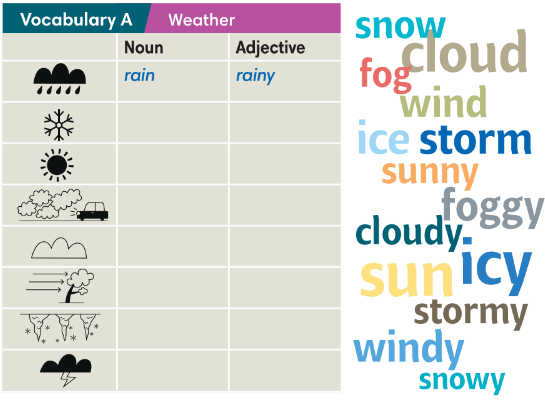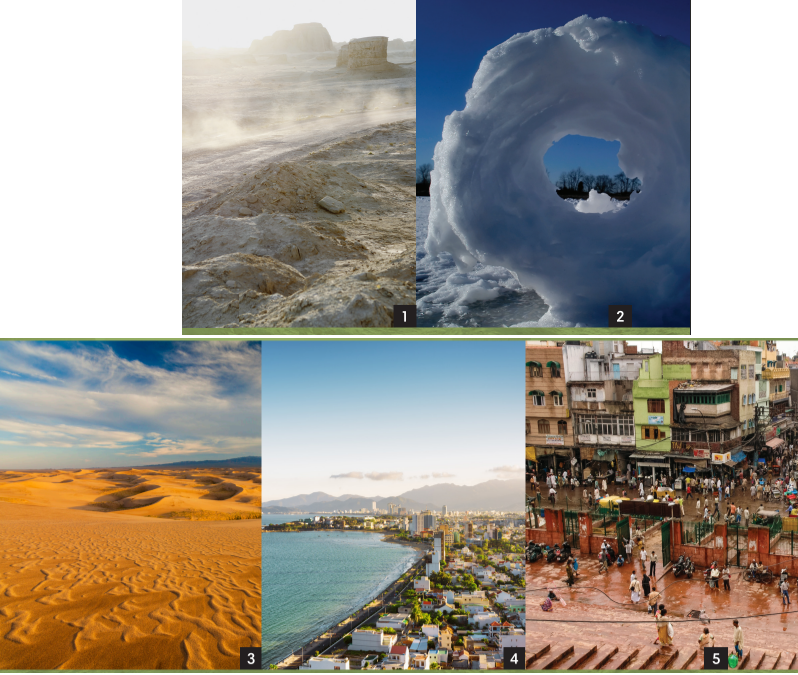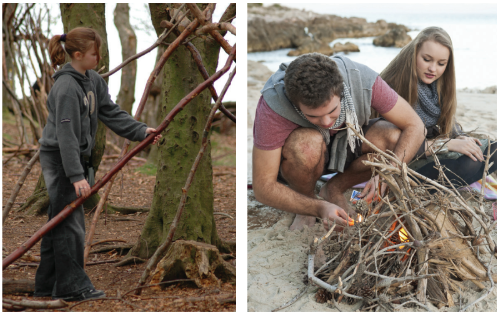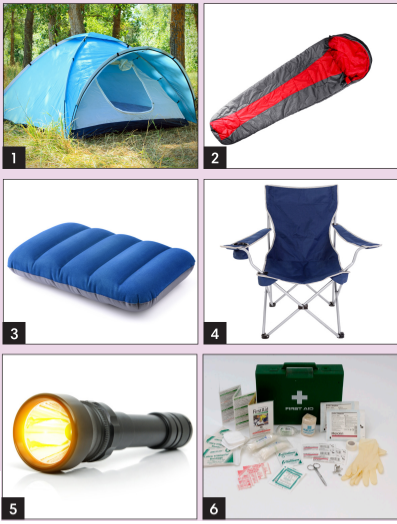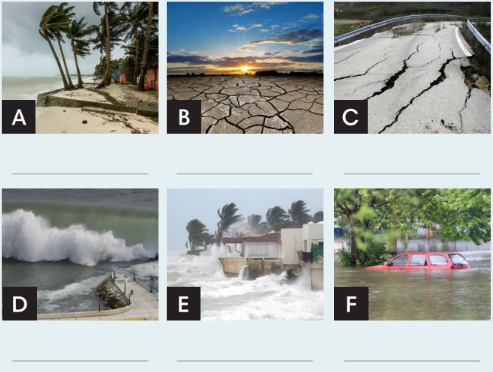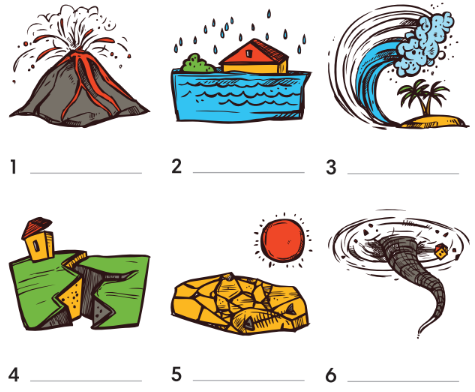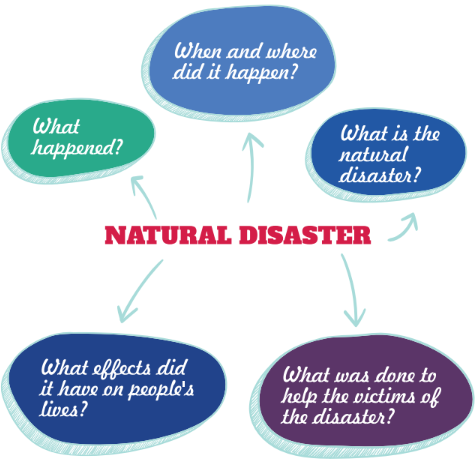Giải SGK, SBT Unit 2. Wild nature English Discovery
Giải SGK, SBT Unit 2. Wild nature English Discovery
3. Complete gaps 1-6 with the words below. Listen and check.
(Hoàn thành khoảng trống 1-6 với những từ dưới đây. Nghe và kiểm tra.)
|
boiling (hot) (sôi (nóng)) |
cool (mát mẻ) |
freezing (đóng băng) |
|
degrees (độ) |
freezing (cold) (đóng băng (lạnh)) |
minus (độ) |
|
Vocabulary B (Từ vựng B) |
Temperature (Nhiệt độ) |
|
(1) ______ hot warm mild (2) ______ cold (3) ______ (4) ______ It’s 35 (5) ______ It’s (6) ______ 10 today. We can say: It’s boiling hot or It’s boiling, It’s freezing cold or it’s freezing. |
|
4. Match the sentences with the words from the Vocabulary C box. Listen and check.
(Nối các câu với các từ trong hộp Từ Vựng C. Nghe và kiểm tra.)
|
Vocabulary C (Từ mới C) |
Natural disasters (Thiên tai) |
|
|
typhoon (bão nhiệt đới) |
drought (hạn hán) |
earthquake (động đất) |
|
flood (lũ lụt) |
hurricane (bão gió) |
tsunami (sóng thần) |
1. The ground floor is covered by water. People are moving upstairs. ______
2. It has moved closer to the centre of Việt Nam after changing direction from northward. ______
3. People are hungry. They can’t grow plants because the ground is dry and hard. ______
4. The building is shaking. ______
5. The beach is empty. People are going into the mountains before the wave arrives. ______
6. It’s very windy and it’s raining. Everybody is inside and the doors and windows are closed. ______
3. Study the Grammar box. Find the Past Simple forms of the verbs in the text. Which are regular / irregular?
(Nghiên cứu hộp ngữ pháp. Tìm các hình thức quá khứ đơn của động từ trong văn bản. Động từ nào có quy tắc / bất quy tắc?)
|
Grammar (Ngữ pháp) |
Past simple (Quá khứ đơn) |
|
Regular verbs (Động từ có quy tắc) It looked strange. (Nó trông thật lạ.) They didn’t move. (Họ đã không di chuyển.) When did that happen? (Điều đó đã xảy ra khi nào?) |
Irregular verbs (Động từ bất quy tắc) We saw an unusual storm. (Chúng tôi đã thấy một cơn bão bất thường.) I didn’t know what to do. (Tôi đã không biết phải làm gì.) Did you take any photos? (Bạn đã chụp bất kỳ bức ảnh nào?) |
|
We use the Past Simple with time adverbials. (Chúng ta sử dụng thì Quá khứ đơn với các trạng từ chỉ thời gian.) E.g yesterday, last week / year, two hours / days / weeks / years ago, in April, in 1595. (Ví dụ: hôm qua, tuần trước / năm, hai giờ / ngày / tuần / năm trước, vào tháng 4, năm 1595.) |
|
3. Study the Grammar box. Find examples of the Past Continuous in the story.
(Nghiên cứu hộp ngữ pháp. Tìm các ví dụ về quá khứ tiếp diễn trong câu chuyện.)
|
Grammar (Ngữ pháp) |
Past Continuous (Quá khứ tiếp diễn) |
|
1. The Past Continuous describes an action at a particular point in the past. (Thì quá khứ tiếp diễn diễn tả một hành động tại một thời điểm cụ thể trong quá khứ.) e.g., It was raining heavily at 9.00 a.m. yesterday. (ví dụ: Trời mưa rất to lúc 9 giờ sáng hôm qua.) 2. The Past Continuous describes an action interrupted by an event. (Quá khứ tiếp diễn diễn tả một hành động bị gián đoạn bởi một sự kiện.) e.g., A few people fell off the road while they were riding motorbikes from work. (ví dụ: Một vài người bị ngã ra đường khi họ đang đi xe máy từ nơi làm việc.) 3. The Past Continuous describes two long actions taking place side by side. (Thì quá khứ tiếp diễn diễn tả hai hành động dài diễn ra song song với nhau.) e.g., People repairing their houses while it was still raining. (ví dụ: Mọi người sửa nhà khi trời vẫn đang mưa.) |
|
2. Listen to Abigali telling Max about her experience with Go Wild. Choose the correct option.
(Hãy nghe Abigali kể cho Max nghe về trải nghiệm của cô ấy với Go Wild. Chọn phương án đúng.)
|
Word Friends |
|
make / build a fire (làm /nhóm lửa) sit / sleep outside (ngồi / ngủ bên ngoài) make / build a sheter (làm / xây dựng một nơi trú ẩn) learn about / listen to the wildlife (tìm hiểu về / lắng nghe động vật hoang dã) see / watch the stars (nhìn / xem các ngôi sao) look for / find wild animals (tìm kiếm /tìm động vật hoang dã) grow / discover unusual plants (phát triển / khám phá thực vật khác thường) |
3. Listen again. Match the activities from Exercise 2 with the days of the week in Abigail’s diary. There are two extra activities.
(Lắng nghe một lần nữa. Nối các hoạt động từ Bài tập 2 với các ngày trong tuần trong nhật ký của Abigail. Có hai hoạt động bổ sung.)
|
Monday (thứ Hai) |
_____________________ |
|
Tuesday (thứ Ba) |
make a fire (nhóm lửa) |
|
Wednesday (thứ Tư) |
_____________________ |
|
Thursday (thứ Năm) |
_____________________ |
|
Friday (thứ Sáu) |
_____________________ |
3. Complete the dialogues with the phrases from the Speaking box. Listen and check.
(Hoàn thành các cuộc đối thoại với các cụm từ từ hộp Nói. Nghe và kiểm tra.)
|
Speaking (Nói) |
Criticising (Chỉ trích) |
|
Criticising (Chỉ trích) What did you do that for? (Bạn đã làm điều đó để làm gì?) Why did you do that? (Tại sao bạn làm vậy?) What were you thinking of? (Bạn đã nghĩ gì?) Just be more careful next time. (Chỉ cần cẩn thận hơn lần sau.) |
Explaining (Giải thích) I didn’t mean to … (Tôi không cố ý… ) I didn’t realise. (Tôi đã không nhận ra.) I really wanted (to) … (Tôi thực sự muốn) … ) I thought you were / it was … (Tôi nghĩ bạn là / đó là … ) |
1.
A: Hey, why did you push in to the queue? I was here first.
B: Oh! I _______ to push in. I _______ you were standing in the queue.
2.
A: I was so angry. I just shouted at the teacher.
B: _______ for?
A: I didn’t see who it was. I _______ another student!
3.
A: You did the wrong exercise for homework! What _______ of?
B: Oh, sorry!
A: Never mind. Just _______.
1. In groups, look at the picture. What natural disasters are they? Put the words and phrases in the right box under each picture. Some words and phrases can go into more than one box.
(Theo nhóm, nhìn vào bức tranh. Đó là những thiên tai nào? Đặt các từ và cụm từ vào ô bên phải dưới mỗi bức tranh. Một số từ và cụm từ có thể đi vào nhiều ô.)
|
a. tropical storm (bão nhiệt đới) b. epicenter (tâm chấn) c. shaking (rung lắc) d. floods (lũ lụt) e. strong winds (gió to) |
f. collapse (sụp đổ) g. badly injured (bị thương nặng) h. water shortage (thiếu nước) i. low rainfall (lượng mưa thấp) k. damage to buildings and houses (thiệt hại cho các tòa nhà và nhà cửa.) |

2. In groups, read the sample writing and complete the table below.
(Theo nhóm, đọc bài viết mẫu và hoàn thành bảng dưới đây.)
A severe drought took place this summer in the Mekong Delta region. The rainy season arrived late last year and was shorter than usual. The rainfall was 8 percent lower than normal at 1,240 mm. The drought had severe effects on people’s lives. The rice crop died due to the shortage of water. Farmers lost their jobs and had to leave the countryside to work in the cities. Many people had to buy water for daily use at a very high price. To overcome this situation, hundreds of volunteers brought water tanks to help affected people in the drought areas.
|
What is the natural disaster? |
|
|
What happened? |
|
|
Where and when did it happen? |
|
|
What are the effects of this disaster? |
|
|
What have been done to help the victims of the disaster? |
|
3. Put the following ideas in the correct column. Some sentences can go into more than one place.
(Đặt những ý tưởng sau đây trong cột đúng. Một số câu có thể đi vào nhiều hơn một nơi.)
|
|
Earthquake |
Typhoon |
|
What happened? |
|
|
|
Where and when did it happen? |
|
|
|
What are the effects of this disaster? |
|
|
|
What have been done to help the victims of the disaster? |
|
|
1. Many people lost their homes.
(Nhiều người mất nhà cửa.)
2. Many people tried to cover their heads and hide under heavy furniture such as tables and beds.
(Nhiều người cố gắng che đầu và trốn dưới đồ nội thất nặng như bàn và giường.)
3. Rescue workers came to help local people.
(Nhân viên cứu hộ đến giúp đỡ người dân địa phương.)
4. Buildings in the epicentre area with weak walls experienced cracks and some houses collapsed.
(Các tòa nhà ở khu vực tâm chấn có tường yếu bị nứt và một số ngôi nhà bị sập.)
5. People could clearly feel a strong shaking.
(Mọi người có thể cảm nhận rõ ràng sự rung lắc mạnh.)
6. It hit the central Việt Nam as one of the biggest storms in the last two decades.
(Đổ bộ vào miền Trung Việt Nam là một trong những cơn bão lớn nhất trong hai thập kỷ qua.)
4. Work in pairs. Complete the dialogues with the words given. Listen and check. Then practice.
(Làm việc theo cặp. Hoàn thành các đoạn đối thoại với các từ cho sẵn. Nghe và kiểm tra. Sau đó thực hành.)
|
volunteer (tình nguyện) Vietnamese (người Việt Nam) typhoon (bão nhiệt đới) |
pioneers (những người tiên phong) Chinese (người Trung Quốc) disagree (không đồng ý) |
1.
A: Do you know the (1) ______ called Noru in Việt Nam?
B: Yes, it affected many (2) ______ people living in the centre of Việt Nam.
2.
A: I think the young (3) ______ in this (4) ______ company should (5) ______ in this project.
B: I (6) ______. I think everyone should take part in this project.
CÁC BÀI TẬP KHÁC


